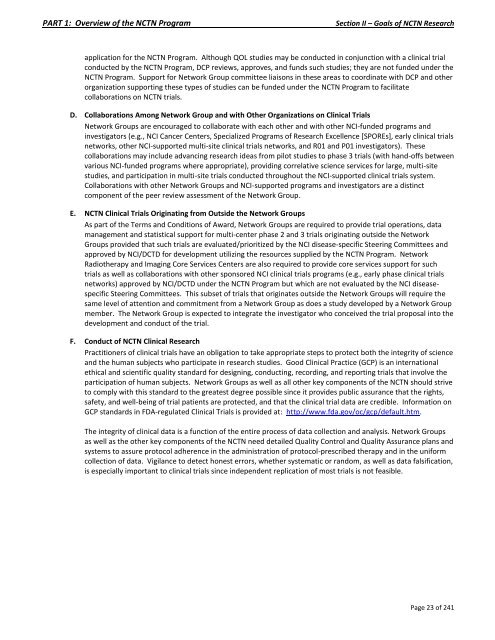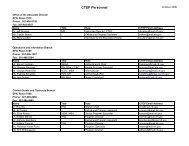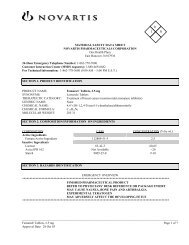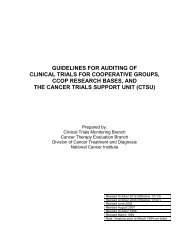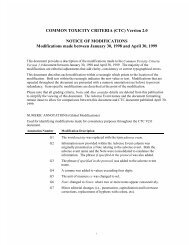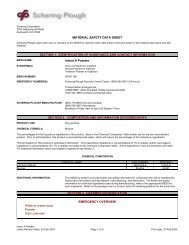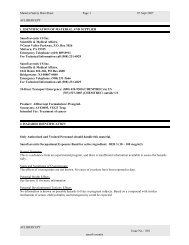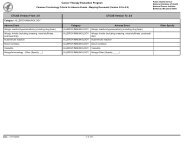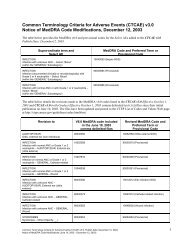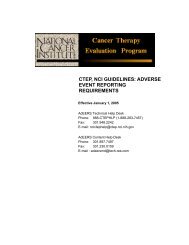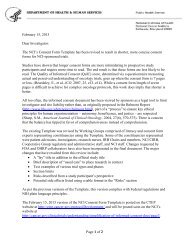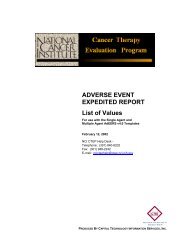NCI National Clinical Trials Network (NCTN) Program Guidelines
NCI National Clinical Trials Network (NCTN) Program Guidelines
NCI National Clinical Trials Network (NCTN) Program Guidelines
You also want an ePaper? Increase the reach of your titles
YUMPU automatically turns print PDFs into web optimized ePapers that Google loves.
PART 1: Overview of the <strong>NCTN</strong> <strong>Program</strong> Section II – Goals of <strong>NCTN</strong> Research<br />
application for the <strong>NCTN</strong> <strong>Program</strong>. Although QOL studies may be conducted in conjunction with a clinical trial<br />
conducted by the <strong>NCTN</strong> <strong>Program</strong>, DCP reviews, approves, and funds such studies; they are not funded under the<br />
<strong>NCTN</strong> <strong>Program</strong>. Support for <strong>Network</strong> Group committee liaisons in these areas to coordinate with DCP and other<br />
organization supporting these types of studies can be funded under the <strong>NCTN</strong> <strong>Program</strong> to facilitate<br />
collaborations on <strong>NCTN</strong> trials.<br />
D. Collaborations Among <strong>Network</strong> Group and with Other Organizations on <strong>Clinical</strong> <strong>Trials</strong><br />
<strong>Network</strong> Groups are encouraged to collaborate with each other and with other <strong>NCI</strong>-funded programs and<br />
investigators (e.g., <strong>NCI</strong> Cancer Centers, Specialized <strong>Program</strong>s of Research Excellence [SPOREs], early clinical trials<br />
networks, other <strong>NCI</strong>-supported multi-site clinical trials networks, and R01 and P01 investigators). These<br />
collaborations may include advancing research ideas from pilot studies to phase 3 trials (with hand-offs between<br />
various <strong>NCI</strong>-funded programs where appropriate), providing correlative science services for large, multi-site<br />
studies, and participation in multi-site trials conducted throughout the <strong>NCI</strong>-supported clinical trials system.<br />
Collaborations with other <strong>Network</strong> Groups and <strong>NCI</strong>-supported programs and investigators are a distinct<br />
component of the peer review assessment of the <strong>Network</strong> Group.<br />
E. <strong>NCTN</strong> <strong>Clinical</strong> <strong>Trials</strong> Originating from Outside the <strong>Network</strong> Groups<br />
As part of the Terms and Conditions of Award, <strong>Network</strong> Groups are required to provide trial operations, data<br />
management and statistical support for multi-center phase 2 and 3 trials originating outside the <strong>Network</strong><br />
Groups provided that such trials are evaluated/prioritized by the <strong>NCI</strong> disease-specific Steering Committees and<br />
approved by <strong>NCI</strong>/DCTD for development utilizing the resources supplied by the <strong>NCTN</strong> <strong>Program</strong>. <strong>Network</strong><br />
Radiotherapy and Imaging Core Services Centers are also required to provide core services support for such<br />
trials as well as collaborations with other sponsored <strong>NCI</strong> clinical trials programs (e.g., early phase clinical trials<br />
networks) approved by <strong>NCI</strong>/DCTD under the <strong>NCTN</strong> <strong>Program</strong> but which are not evaluated by the <strong>NCI</strong> diseasespecific<br />
Steering Committees. This subset of trials that originates outside the <strong>Network</strong> Groups will require the<br />
same level of attention and commitment from a <strong>Network</strong> Group as does a study developed by a <strong>Network</strong> Group<br />
member. The <strong>Network</strong> Group is expected to integrate the investigator who conceived the trial proposal into the<br />
development and conduct of the trial.<br />
F. Conduct of <strong>NCTN</strong> <strong>Clinical</strong> Research<br />
Practitioners of clinical trials have an obligation to take appropriate steps to protect both the integrity of science<br />
and the human subjects who participate in research studies. Good <strong>Clinical</strong> Practice (GCP) is an international<br />
ethical and scientific quality standard for designing, conducting, recording, and reporting trials that involve the<br />
participation of human subjects. <strong>Network</strong> Groups as well as all other key components of the <strong>NCTN</strong> should strive<br />
to comply with this standard to the greatest degree possible since it provides public assurance that the rights,<br />
safety, and well-being of trial patients are protected, and that the clinical trial data are credible. Information on<br />
GCP standards in FDA-regulated <strong>Clinical</strong> <strong>Trials</strong> is provided at: http://www.fda.gov/oc/gcp/default.htm.<br />
The integrity of clinical data is a function of the entire process of data collection and analysis. <strong>Network</strong> Groups<br />
as well as the other key components of the <strong>NCTN</strong> need detailed Quality Control and Quality Assurance plans and<br />
systems to assure protocol adherence in the administration of protocol-prescribed therapy and in the uniform<br />
collection of data. Vigilance to detect honest errors, whether systematic or random, as well as data falsification,<br />
is especially important to clinical trials since independent replication of most trials is not feasible.<br />
Page 23 of 241


